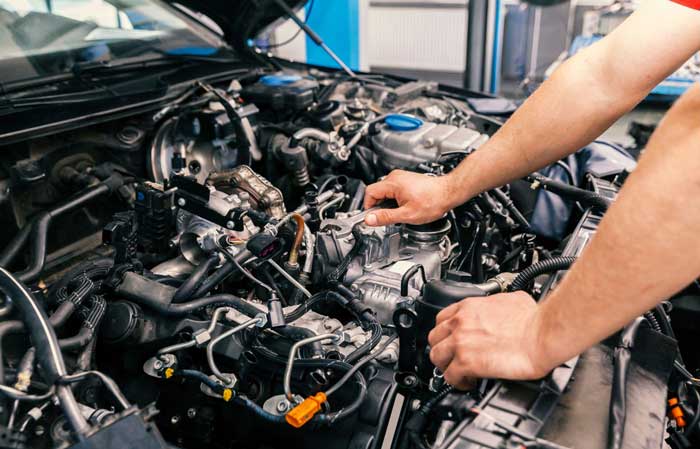So, picture this – you’re cruising down the road in your diesel-powered beast, feeling like you own the asphalt jungle, when suddenly, sputter, cough, silence. Yep, your trusty engine decides to play dead on you. But why, oh why, does it do that? Well, buckle up, folks, ’cause I’m about to spill the beans on what makes those diesel engines throw a diva fit and call it quits.
I’m no engine whisperer, but I’ve had my fair share of staring contests with stubborn diesel engines. From fuel issues to air blockages, these grumpy machines have a whole bag of tricks up their pistons to keep you on your toes. So, grab a cup of coffee, sit back, and let’s jump into the wild world of diesel engine drama.
Common Causes of Diesel Engine Failure
I’ve had my fair share of adventures with diesel engines, and let me tell you, when they decide to play dead, it’s not a fun time. Let’s jump into the quirky world of diesel engine failures and uncover some of the common culprits that can bring these beasts to a screeching halt.

Fuel System Issues
Ah, the fuel system – the heart and soul of our diesel-powered friends. When this system decides to go on strike, it’s like dealing with a picky eater who only wants premium fuel. Here are some mischievous fuel system issues that can leave your engine sputtering:
- Dirty Fuel Filters: Imagine your engine trying to breathe through a clogged straw. Yep, that’s what dirty fuel filters do – they suffocate your engine’s fuel supply.
- Air in the Fuel Line: Air might be great for a balloon ride, but it’s the last thing you want in your fuel line. It can cause serious disruptions in the fuel delivery process, making your engine act all flustered.
Air Intake Problems
Let’s talk about the breath of life for your engine – the air intake system. Just like us humans need fresh air, diesel engines crave a clean and uninterrupted airflow. Here are some shenanigans that can mess with your engine’s breathing:
- Clogged Air Filters: Picture yourself trying to run a marathon with a pillow over your face – not a pleasant thought, right? That’s how a clogged air filter makes your engine feel.
- Leak in the Air Intake System: Your engine doesn’t want to play detective, especially when it comes to tracking down pesky air leaks. These leaks can disrupt the air-to-fuel ratio, leaving your engine in a state of confusion.
Mechanical Failures
Ah, mechanical failures – the mischievous troublemakers lurking in the shadows of your engine bay. From worn-out parts to cranky components, here are some mechanical mishaps that can throw a wrench in your engine’s day:
- Faulty Glow Plugs: Just like a sleepyhead hitting the snooze button in the morning, faulty glow plugs can make your engine hesitant to start, especially in colder weather.
- Injector Issues: Injectors are like the maestros of the fuel orchestra, and when they start playing out of tune, your engine’s performance takes a nosedive.
So, there you have it – a peek into the whimsical world of diesel engine failures. Remember, keeping your engine happy is the key to avoiding these unexpected breakdowns.
Symptoms of a Failing Diesel Engine
As a diesel engine enthusiast, I’ve encountered my fair share of heart-stopping moments when these beasts decide to call it quits unexpectedly. Let’s navigate through the murky waters of diesel engine woes and explore the telltale signs that your engine might be on the verge of a breakdown.
Decreased Performance
When your diesel engine starts acting like it’s had one too many cups of decaf, something’s definitely amiss. Here are a few signs that your engine might be waving a white flag in the performance department:
- Sluggish acceleration that feels like a tortoise racing a snail.
- Decreased power output, making uphill climbs feel like scaling Mount Everest with a backpack full of rocks.
- Smoky exhaust that rivals a barbecue gone wrong – black, white, or blue smoke signals trouble brewing.
Unusual Noises
Diesel engines aren’t known for their serene purring, but when the cacophony reaches new levels of chaos, it’s time to perk up those ears and listen for these alarming sounds:
- Knocking noises that sound like a woodpecker took up residence under your hood.
- Whining or squealing akin to a stuck pig – not the symphony you want emanating from your engine.
- Rumbling or rattling that turns your once smooth ride into a percussion concert on wheels.
Keep an ear out for these warning signals, and you might just save yourself from a full-blown engine meltdown.
Preventative Measures for Diesel Engine Longevity
Ah, the elusive quest for keeping our diesel engines humming along smoothly! Let’s jump into some tips and tricks to ensure our beloved engines keep chugging and avoid unexpected pit stops.
Regular Maintenance
Ah, the joy of regular maintenance! It’s like taking your diesel engine to the spa for a rejuvenating treatment. Here are some key maintenance tasks to keep your engine purring like a contented kitten:
- Oil Changes: Just like how we need our morning coffee, the engine needs fresh oil to keep everything running smoothly. Don’t skimp on this vital task.
- Filter Replacements: Think of filters as the engine’s personal cleaners, ensuring only the finest air and fuel make their way in. Swap them out regularly to maintain peak performance.
- Coolant Check: Nobody likes an overheated engine! Keep an eye on your coolant levels to avoid any steamy situations.
Monitoring and Replacements
It’s like being a detective for your diesel engine—keeping an eye out for any suspicious activity and nipping potential issues in the bud. Here’s what to watch for:
- Gauges and Warning Lights: They’re like the engine’s secret language. Listen to what they’re telling you and act accordingly.
- Leaks and Drips: If your engine starts shedding more than your pet cat, it’s time to investigate and plug those leaks.
- Belts and Hoses: These are like the engine’s fashion accessories—stylish yet functional. Replace them before they decide to throw in the towel.
So, there you have it, folks! By pampering your diesel engine with regular maintenance and vigilant monitoring, you’ll be cruising down the road with a happy and healthy engine for miles to come.
How to Address a Diesel Engine Failure
I love a good challenge, especially when it involves troubleshooting a diesel engine failure. When faced with such a situation, immediate actions and long-term repairs are key to getting your engine back on track. Let’s jump into how to tackle this breakdown like a pro!
Immediate Actions
Check the Fuel Supply: First things first, make sure your diesel engine isn’t just thirsty. Check the fuel gauge and ensure you have an adequate supply of diesel. Running on empty won’t get you anywhere!
Inspect the Air Filters: Like a breath of fresh air, your engine needs clean filters to function optimally. Check for any clogs or dirt buildup in the air filters that might be suffocating your engine.
Scan for Leaks: No one likes a leaky situation, especially not your diesel engine. Look for any leaks in the fuel system, coolant system, or oil lines. Patching up these leaks can prevent further damage.
Examine the Battery: Your diesel engine needs a strong heart to keep running. Check the battery terminals for corrosion and ensure it’s delivering the necessary power to start the engine.
Clear the Blockage: Just like a clogged drain, a blocked exhaust can stop your engine in its tracks. Check for any obstructions in the exhaust system that might be hindering proper airflow.
Long-Term Repairs
Investigate the Fuel System: If your diesel engine keeps stalling, it might be time to dive deeper into the fuel system. Check the injectors, fuel pump, and fuel lines for any issues that could be affecting the engine’s performance.
Inspect the Cooling System: Overheating can spell disaster for your diesel engine. Make sure to inspect the radiator, hoses, and coolant levels regularly to prevent any cooling system failures.
Evaluate the Electrical System: A healthy spark is essential for your engine to roar to life. Check the spark plugs, wiring, and alternator to ensure everything is in top-notch condition.
Timing Belt Inspection: The timing belt is the unsung hero of your engine’s operation. Make sure to inspect and replace it according to the manufacturer’s recommended schedule to avoid any timing-related breakdowns.
Professional Tune-Up: When in doubt, trust the experts. Schedule a professional tune-up for your diesel engine to catch any underlying issues and keep it running smoothly for miles to come.
Conclusion
Well, folks, there you have it! Diesel engines can be as finicky as a cat with a hairball, but fear not! By staying on top of maintenance like a pro and keeping an eye out for warning signs, you can prevent those pesky breakdowns. Remember, a little TLC goes a long way in keeping your engine purring like a contented kitten. And if all else fails, don’t panic! Just follow the troubleshooting steps we’ve covered, and you’ll be back on the road in no time. So, next time your diesel engine decides to play hide and seek, show it who’s boss with these handy tips. Happy motoring, my fellow engine enthusiasts!
How can I prevent diesel engine breakdowns?
Regular maintenance such as oil changes, filter replacements, and coolant checks are crucial for preventing diesel engine breakdowns. Monitoring gauges and warning lights, addressing leaks, replacing belts, and hoses also help maintain engine health.
What should I do if my diesel engine fails?
In case of a diesel engine failure, check the fuel supply, inspect air filters, scan for leaks, examine the battery, and clear blockages. For long-term repairs, investigate the fuel system, inspect the cooling system, evaluate the electrical system, inspect the timing belt, and consider a professional tune-up.
How do I troubleshoot a diesel engine that starts then dies?
A clogged fuel filter can cause the engine to start, chug, and then die. Ensure the injectors have adequate fuel supply by replacing the clogged fuel filter to troubleshoot this frequent issue.
How long is diesel usable before it goes off?
Diesel can remain usable for six to 12 months before becoming ‘gummy.’ After this period, it can clog filters and create engine issues if used. Regularly monitor and replace diesel stored for extended periods.
What can cause a diesel engine to shut off when hot?
Rapid fuel boiling at high temperatures can cause the engine to stall. The fuel vapor produced flows into the fuel pump, decreasing pump load and current consumption, resulting in engine stall. Ensure proper cooling system maintenance to prevent overheating-related issues.

